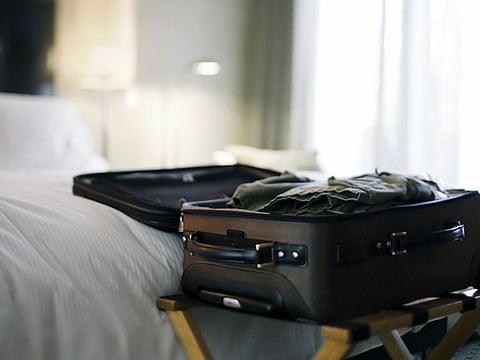Dangers of putting a suitcase on the bed
There’s a suspicion that hotel rooms may have bedbug infestation

It is unlikely that you come home from a trip and stand on top of your bed still wearing your street shoes. Why would you? Your shoes are covered in God-knows-what, and your bed is a sacred space.
For some travellers, putting their suitcase on their bed is just as offensive. The wheels of our luggage tread the same soiled path as our shoes, rolling through airport bathrooms, sidewalks and public transportation. To these travellers, the thought of plopping said suitcase atop the same place for sleeping is an affront to humanity.
While it might sound gross to put a worldly bag on your bed, is it actually harmful to your health? According to Phyllis Kozarsky, an expert travel health consultant for the Centres for Disease Control (CDC) and Prevention’s travellers’ health branch and the chief medical editor of the CDC reference guide Health Information for the International Traveler, most public health professionals don’t consider luggage a major transmitter of disease.
“We have not identified outbreaks related to dirty luggage,” Kozarsky says.
We live in a germ-filled world. Coming into contact with bacteria is part of life, and trying to sanitise every travel accessory or surface we touch can turn into a Sisyphean task.Natalie B. Compton, travel writer
Where travellers may benefit from cleaning their luggage is if there’s a suspicion that their hotel room has a bedbug infestation.
“Then they certainly would benefit by vacuuming out their luggage or cleaning it after they returned home,” Kozarsky says. But otherwise, she says, the bag is “not typically a source of transmission of illness”.
Even if your luggage touching your bed won’t hurt you, you might still be plain old revolted. After all, travel is a germ-addled experience.
“You have people ... carrying all types of different germs. Some of them are sick, and you now have them populating these public travel places,” says Colleen Costello, CEO of Vital Vio, a company that makes antibacterial LED lights.
Your fellow travellers have to touch all the same things you have to touch, from the TSA checkpoint to the aeroplane, the train ticketing machine to the handrail in your train car.
Touch points in travel
“They have microscopic germs on them. And, realistically, (janitorial staff) may be getting to clean them rather infrequently,” Costello says of the many touch points involved in travel. “Everything you bring into these public spaces can basically pick up or drop off different germs, and you can’t see them. There’s no way to really know when you or your personal belongings are exposed.”
For your peace of mind, Costello recommends giving your bag a quick disinfection or storing it on a luggage rack. Technically speaking, you could go beyond disinfecting your luggage wheels and sanitise the rest of your travel experience — the aeroplane tray table, entertainment screen, armrests, hotel room door and remote control. But Kozarsky, the CDC travel medicine expert, doesn’t vouch for that lifestyle.
Also Read: Travelling light and smart
Also Read: The lingering charm of train travel
Also Read: Who said air travel was glamorous?
Also Read: Never travel without your credit card
Also Read: Travel broadens your seat
“It’s hard to keep up with every doorknob, every railing. Think of what you do between your home and your destination,” Kozarsky says. “You can become a little neurotic that way.”
We live in a germ-filled world. Coming into contact with bacteria is part of life, and trying to sanitise every travel accessory or surface we touch can turn into a Sisyphean task.
Instead, make sure you’re washing your hands with soap and water after using the restroom and before you eat. Carry hand sanitiser for the times you don’t have access to soap and water. Avoid touching your eyes and mouth as much as possible. And remember: Dodging illness isn’t a perfect science. Getting a cold from time to time is human.
— Washington Post
Natalie B. Compton is a writer specialising in travel reporting.


